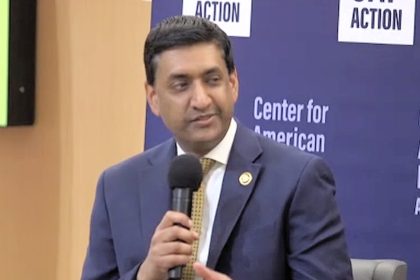Countering China and Unleashing American Innovation on 5G

WASHINGTON — The term 5G is all over telecommunications these days. It comes with the promise of data speeds up to 100 times faster than current connections and the ability to support devices that will perform functions not yet imaginable. But it also comes with controversy over trade and technology standards.
The global shift to 5G is proving to be a key battleground, with growing competition between the United States and China presenting both risks and opportunities. Washington think tank the Center for American Progress jumped into the fray with a recent discussion of ways the United States can counter China and unleash the power of American innovation to compete in the growing 5G space and other high-tech sectors.
“It’s easy to see [5G] as just pipes and infrastructure, but it is beyond this,” explains Lindsay Gorman, fellow for Emerging Technologies at the German Marshall Fund of the United States. “It has applications… in the entire future ecosystem of the internet.”
A pair of Chinese companies, Huawei and ZTE, have emerged as leaders in the 5G technology space, much to the dismay of American industry and policymakers who are concerned with a power struggle over trade and technology. Many see the 5G dispute as a trade-first issue, but other concerns with 5G competition include economic competitiveness issues as well as complications of cyber and national security.
“Huawei is not working alone, it has the deep resources of the Chinese state,” said Melanie Hart, senior fellow and director for China Policy at the Center for American Progress, who co-authored CAP’s recently released report which offers potential solutions to the Huawei challenge. She fears that Chinese telecom-equipment manufacturers, including Huawei and ZTE, have close ties to China’s authoritarian one-party government and could be exploited.
Many in U.S. national security worry that Chinese National Intelligence Law, which requires companies to comply with Communist Party demands to turn over data or participate in network-disruption activities, could allow Beijing to cull sensitive personal or corporate data from the likes of Huawei and ZTE, steal intellectual property from companies, or perform cyberattacks on the West like using concealed kill-switches to incapacitate technology systems during critical times.
“We need to make sure our industrial base is not being infiltrated illicitly by others, particularly the Chinese,” said Sen. Jack Reed, D-R.I. “The Chinese have built up their tech, and Russia to a degree has done the same thing. What we thought was a period of PaxAmericana, with no competition and everyone becoming commercial partners… well, that’s not the case.”
In what he called a “threat to the new world order,” Reed insisted that the U.S. is engaged in shrewd strategic competition with China, and that tech is the key battlefield on both the economic and security side.
“Our economic and security challenges and solutions are interlaced,” Reed said, calling for a renewed focus on tools, resources, and alliances. “We have, over the last 30 years, integrated the economy of the world in a significant way. It would be difficult to decouple, but [we need to] identify critical elements for national security and see what our supply chain looks like.”
He called for “a much more robust foreign policy in the context of allies” with nations like Australia, South Korea, and Japan “to deter any type of conflict in the Pacific and hopefully worldwide… This all goes to making the Chinese think twice about doing something dangerous in the Pacific that would invite retaliation and conflict.”
One way to pursue stronger alliances and ramp up America’s industrial, technological, and innovative capacity would be to have greater participation in the standards bodies that develop standards cohesiveness for 5G. With no firm 5G technology standards currently in place, essential 5G features and functionalities are still being developed.
Chinese companies have played an active role in 5G patents and technical standards, influencing their standards to become the general framework. By seizing this initiative in standards development, Chinese companies have not only gained an advantage in developing equipment but could also use this competitive advantage to undermine interoperability. For example, companies may have to pay royalties to Huawei for using patents it holds that have become part of industry standards in 5G, even if the company were to be blocked from 5G networks in the future.
“Standards have become frameworks, but the content of the framework is left open to the vendors themselves,” said John Baker, senior vice president of Business Development at Mavenir. “We need to move to open and interoperable standards with standards bodies filling in all the detail.”
Baker also suggests a focus on software, in lieu of hardware, to give America an advantage in 5G.
“Software is becoming the dominant choice of building these networks,” he said, citing the increased use of open radio access networks and virtual radio access networks. These networks are concepts based on interoperability and standardization of RAN elements, including a unified interconnection standard for white-box hardware and open-source software elements from different vendors.
“VRAN fundamentally converts from hard- to software so you can run it on a standard computer server,” explained John Mezzalingua, CEO of JMA Wireless. JMA’s 100% virtualized RAN platform, XRAN, “involves no custom hardware, purely software,” and has been used to replace an entire room of ZTE hardware.
“This is how you compete with the Chinese. You do it through innovation,” said Mezzalingua.
Gorman agrees that the U.S. will have a natural advantage as 5G moves away from hardware, but doesn’t believe that virtualized networks alone are the solution to the 5G race.
“We need to be incentivizing more U.S. innovation,” Gorman stressed. “Open and virtual network conversations answer the [question of finding a] viable alternative [to Chinese 5G hardware], but it is also important to consider, at the diplomatic level, the effect these conversations are having.”
She and others warned that it must not appear that U.S. national alarms about Huawei seem to be promoting American companies at the expense of Chinese companies. This could dismiss legitimate fears as protectionist and xenophobic.
Gorman’s biggest suggestion for the future of 5G is to “bring in allies and partners… and pursue goals in a way other nations share.”
























